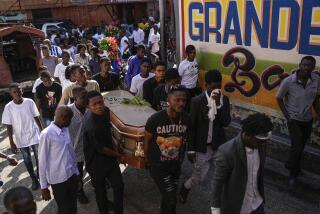Black Police Caught in Web of S. African Strife : Soldier Stoned to Death by Mourners After Rites for Lawyer
- Share via
RAYI, South Africa — A young black soldier, caught in a crowd of angry mourners, was stoned to death and his body then burned after the funeral here Sunday for Victoria Mxenge, a prominent black civil rights lawyer.
The killing of Mxenge touched off riots last week around Durban in which at least 65 people died.
The burned bodies of two other slain blacks were found by police Sunday--one in Mamelodi, a black township outside Pretoria, the capital, and the other near Cradock in eastern Cape province. The circumstances of their deaths were not certain, but police assumed that they were slain as “sellouts” because the bodies were burned in what is now almost a ritual in such killings.
Evidence of Anger
The three deaths reported Sunday provided additional evidence of the anger over apartheid that has built up within the black community, particularly since the imposition three weeks ago of a state of emergency--amounting to virtual martial law--in 36 magisterial districts of South Africa embracing more than 60 black townships.
Buried Near Her Husband
The soldier killed here was a member of the defense force in Ciskei, a nominally independent tribal homeland for South Africa’s Xhosa people. He was driving a small truck past the Rayi cemetery, outside King William’s Town, where Mxenge, 43, was buried alongside her husband, Griffiths Mxenge, who was killed in a similar assassination four years ago.
The crowd began to stone the soldier’s vehicle. He got out and tried to flee across the field. Two companions in the vehicle escaped by threatening to fire on the crowd with their rifles, but both men appeared to have been injured in the heavy barrage of stones.
Hit by one rock, then a second and a third, the fleeing soldier staggered and fell, and his pursuers continued to stone him without mercy. They then covered his body with dry brush, doused it with gasoline and set it afire.
“Death to the traitors!” the crowd shouted. “Kill them all!” The mood was jubilant, as if Mxenge’s murder by four black men had been avenged in part.
The mood of the estimated 10,000 mourners at Mxenge’s funeral was reflected in funeral speeches calling for the violent overthrow of South Africa’s white-minority regime and for “punishment of all traitors to the black people.”
‘We Are Going to Fight’
“We are going to fight for our liberation, and we are going to use everything we can lay our hands on, even if it is gunpowder,” declared Steve Tshwete, regional president of the United Democratic Front, a coalition of anti-apartheid groups. “If we have to shoot to get our liberation, we are going to shoot.”
Robin Gcweta, a trade union official, told the mourners, “There comes a time when a people have to fight or submit, and we cannot submit.”
Although black militancy has risen sharply in the past six months, calls to arms have been rare. Such calls here Sunday may reflect a break with the nonviolent strategy pursued by the United Democratic Front and other anti-apartheid groups that have not been outlawed.
The flag of the African National Congress, a group that was outlawed here 25 years ago, was hung in a tree above the speakers’ platform at Mxenge’s funeral, and her coffin was draped in the organization’s colors of black, green and gold.
Tshwete and other speakers rejected in advance the rumored reforms that South African President Pieter W. Botha is expected to propose Thursday.
Freedom for Mandela
Father Smangaliso Mkhatshwa, general secretary of the Southern African Catholic Bishops Conference, said concessions such as a fourth chamber of Parliament for blacks would not go nearly far enough. He demanded the release of African National Congress leader Nelson Mandela and other political prisoners, the immediate lifting of the state of emergency and the withdrawal of police and troops from black townships.
Messages from Mandela in prison and from Oliver Tambo, the president of the African National Congress, who lives in Zambia, encouraged the new hard-line militancy.
In his speech, Tshwete implicated Chief Mangosuthu Gatsha Buthelezi, chief minister of Kwazulu, the Zulu tribal homeland, in the murder of Mxenge and blamed Inkatha, the Zulus’ political organization, for the deaths last week of many United Democratic Front members in riots in the black townships of Durban.
That charge could provoke more clashes between rival black political groups, particularly when funeral services are held for the Durban riot victims.
More to Read
Sign up for Essential California
The most important California stories and recommendations in your inbox every morning.
You may occasionally receive promotional content from the Los Angeles Times.












